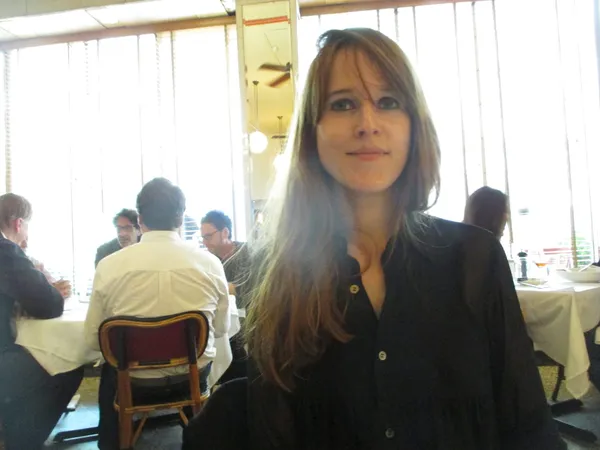Celine Danhier's all-hands-on-deck Blank City, edited to perfection by Vanessa Roworth, enters the world of the No Wave and Cinema of Transgression. We see and hear about the work of Bette Gordon, Casandra Stark Mele, Charlie Ahearn, Michael Oblowitz, Nick Zedd, Sara Driver, Susan Seidelman, Maripol, Patti Astor, Eric Mitchell, Beth B, Vivienne Dick, Vincent Gallo, John Lurie, Steve Buscemi, Jean-Michel Basquiat, Lizzie Borden, Amos Poe, John Waters, James Nares, Jim Jarmusch, Anders Grafstrom, Richard Kern, Ann Magnuson, James Chance, Lydia Lunch, Pat Place, Becky Johnston, Adele Bertei, Scott B, Tommy Turner, Tessa Hughes-Freeland, Kemra Pfahler, JG Thirlwell, Michael Holman, Lung Leg, Michael McClard, and David Wojnarowicz.
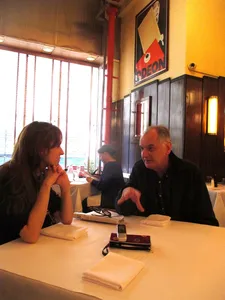 |
| Ed Bahlman on Celine Danhier's Blank City: "What's so great with you and the filmmakers, they're all so relaxed with you." Photo: Anne-Katrin Titze |
Ed Bahlman's 99 Records plays a role here with Liquid Liquid, Bush Tetras, Glenn Branca on the soundtrack of Blank City, and Smithereens with ESG and Singers and Players ending up in Seidelman's film when Ed received a call from Susan looking for help on two scenes. Two years before there was a record label, the shop 99 (pronounced Nine Nine) was known internationally for having independent and imports-only music and for featuring the No Wave bands Teenage Jesus and the Jerks, DNA, Mars, and The Contortions that are discussed in Blank City.
When I met with Celine Danhier on Good Friday at The Odeon in Tribeca to discuss Blank City, Ed Bahlman initially joined us to share his thoughts on her documentary, and the director quickly started to interview Ed.
Anne-Katrin Titze: It's almost ten years now that the film came out and you've been working on it for a long time before that.
Celine Danhier: It is written on IMDb that the release date was Tribeca, but then the movie went back to the editing room for like two years.
AKT: It aged really well. It feels timeless.
CD: A lot of people told me that. When the documentary was released, I didn't really expect anything. It got some really good responses.
Ed Bahlman: Who was the first filmmaker contact you had?
CD: The first person that I interviewed was Amos [Poe], no, sorry, the first one was Richard Kern. In the beginning I didn't know if I wanted to explore the Cinema of Transgression or if I wanted to explore the No Wave. I mean, I wanted to explore both, but it was so dense. I did two interviews with Richard Kern, because the first was about three hours long.
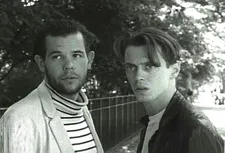 |
| Mark Boone Junior with Steve Buscemi in Eric Mitchell's The Way It Is |
And he was like "Do you have more questions?" And I was like "Yeah, I have more and more." He was like "Okay, let's do another interview in two months." He was really generous with his time. And then I got Amos a week later, and he said "Let me call James Nares." And then James Nares said "Let me call Jim Jarmusch." It was really like that. And then at the same time I had the music scenes and I interviewed Pat Place.
EB: You did a great job with your film. I know those times very well.
CD: Thank you. I remember that I was dealing, for the music for example, with James Chance directly, to be able to use some of his songs. Everybody was very collaborative, you know.
EB: You have Bush Tetras' Too Many Creeps, which I first recorded and mastered [and released on 99 Records].
CD: Bush Tetras, yeah.
EB: And Liquid Liquid with Sal [Principato].
CD: How did you start?
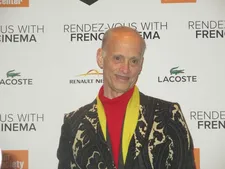 |
| Celine Danhier: "I'm a huge fan of John Waters and totally fascinated by his work." Photo: Anne-Katrin Titze |
EB: I started with selling records. The first records were only the most recent independent releases that I brought back from London. And I was not going to have any major American labels. So it didn't matter when the Ramones had a Sire release. Talking Heads I didn't carry their records [the only one was the limited-edition Robert Rauschenberg designed cover for the Speaking in Tongues album], I was only going to carry independents and imports.
I would call Rough Trade [in London] at 5 in the morning on a Friday. And I had them shipped air freight so they would be in the shop on Saturday. What everybody was reading about in NME and Sounds was in 99 on Saturday morning.
So that's how I started with all the independent people who were doing records themselves. Bands like the B-52's coming up to me with Rock Lobster. And then I saw nobody doing a record label, only Charles [Ball]. And then I was going to do Bush Tetras first. Glenn [Branca] takes credit in all those different articles but he must have gotten word that I was interested in Bush Tetras. I wanted to see them rehearse. I wanted to see how they got along.
CD: I remember when I met Pat [Place, Bush Tetras guitarist] and she was like super nice.
EB: But I had to see how they worked together.
CD: For sure.
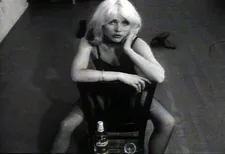 |
| Debbie Harry in Amos Poe's Unmade Beds |
EB: Because it was me going in for the record label thing. I knew all the independents in Europe. I drove up to Manchester to get Factory Records records, to have them in 99. To have A Certain Ratio and Orchestral Manoeuvres in the Dark. They didn't even have the sleeves ready. Tony Wilson came running to the house from Granada [TV] to meet me the first time. They Red Starred the sleeves to London when I was taking the plane back, so I would have them in the store the next day.
Glenn Branca was so disappointed with New York, coming from Boston. He thought he had something going right away. He knew all the musicians, the whole crowd but he said he couldn't even get a gig. He didn't know I was thinking of Bush Tetras but he might have heard. So he organized a gig at TR3. I don't remember who he was playing with, but it was great, really overwhelming. So I said, okay, we'll do something, too.
Bush Tetras took longer to organize. They were wondering why does this guy want to come to our rehearsal space, even though they knew me. Laura [Kennedy, Bush Tetras bass player] came to the shop, she was the spokesperson. She said "We have a lot of interest from England and Germany, but they want us to go in the studio and record demo tapes." And this is after they'd already been a club hit playing live [in New York]. The audience's reaction was strong. And I said that's ridiculous. That's really why I started the label.
CD: So when did you start the label?
EB: '80. ''78 selling records [one of the first was the Brian Eno produced No New York album that James Nares mentions in Blank City]. R.E.M. in '81 bringing in Radio Free Europe to sell.
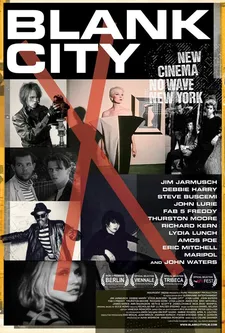 |
| Blank City poster, screened as a work-in-progress during the 2009 Tribeca Film Festival |
AKT: That was about the time that you were covering in Blank City, no?
CD: I'm starting a little bit earlier, '77. I mean when Amos did his Blank Generation, it was in '77, '78. So you started with Bush Tetras?
EB: Yes. But it wasn't the first release. Branca was quicker. Also he's been taking credit, because I don't do interviews. I just see all this stuff because people contact me for books.
CD: And you don't do any interviews?
EB: I haven't done so.
AKT: This is the first right here. It was very last minute that Ed decided to join us here.
EB: I wanted to tell you what a great job you did with the film. It did put things into context and also why I did not go into their scene. I wanted to be orbiting around it and then contributing where I could. Seeing your film reminded me again why I felt that way. Richard Kern, all those people.
CD: Yes, James Chance, you know …
EB: When he talks about kicking the people, getting them off the floor. I was at that first show of theirs [The Contortions] with Pat Place. That's where I saw Pat first. James kicking in those really pointy shoes.
CD: I think I saw Pat performing the last time in New York last year. Did you see her?
EB: No, no.
CD: Like two years ago, I ran into her at a screening of a documentary and she was telling me that she was preparing a show. I'm still a huge fan of James Chance.
EB: He's an unusual soul.
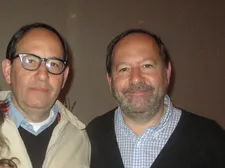 |
| Blank City executive producers Dan Braun and Josh Braun Photo: Anne-Katrin Titze |
CD: He's amazing.
AKT: Whom of the people in your film are you still in touch with?
CD: I'm still in touch with Amos and we are trying to develop something together, like a narrative film. I'm still in touch with James, I'm still in touch with a bunch of people. I was kind of the outsider when I arrived in New York ten years ago with my idea and my enthusiasm. People were very generous with me, giving me their time, their stories, putting me in touch with other people.
EB: And Lydia Lunch?
CD: Lydia, obviously. It was not easy with Lydia. Lydia is amazing. I mean, I love her as a musician, as an artist and as a woman. She's a very powerful woman. Her manager was a little harsh on me.
EB: What's so great with you and the filmmakers, they're all so relaxed with you. You even got Eric Mitchell to come around.
CD: Eric was not easy as well. Eric didn't want to be in Blank City for like the first two years. He was telling me no, no, no.
AKT: He was the one in the extra where you are stalking him on the street!
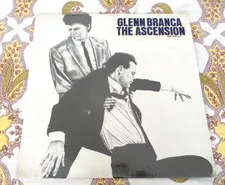 |
| Glenn Branca The Ascension (99 Records - 99-001LP) produced by Ed Bahlman LP album cover designed by Robert Longo Photo: Anne-Katrin Titze |
CD: It was on 12th Street. It was him and his friend. When I sent him the first request, he contacted me with a very long e-mail, super sharp. A very good e-mail saying "No, I don't want to be part of that. I made these movies and I don't want to be part of this documentary."
At the same time Scott B was doing the same kind of project. So people were telling me this. So for Eric, every two or three months I was checking on him. I was like, "Hey, you know, I just got John Lurie today. And I just got Steve Buscemi who did this movie with you [The Way It Is]. So it would be really good to do some things together." And at one point he said, "Okay, come to my place and let's meet up." So I met him and he still declined. But then he had this idea to use this kind of fake interview, where I'm running after him.
EB: Oh, that's good.
AKT: It was his idea?
CD: It was his idea. I just remember it was very cold in New York. It was February and we were outside and I think you can see it on my face.
AKT: He is wearing a big Russian hat.
CD: Yeah, and he was like, "Celine, I found the place. You are going to run after me." And I basically had some lines that I had to say. And every time I forgot my lines rushing after him. So we had to do like 20 takes. I thought it was kind of funny. And I thought, you know what? I have so much respect for Eric, that I was like "if you want to be part of Blank City like that, that's totally cool with me."
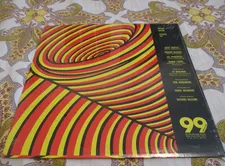 |
| Liquid Liquid (99 Records - 99-11EP) produced by Ed Bahlman Photo: Anne-Katrin Titze |
AKT: He has one of the greatest quotes about his inspiration. From Warhol, the concept. From Fassbinder …
EB: … the ensemble.
AKT: … the ensemble cast. Pasolini's integrity. And Melville's hat …
EB: … and sunglasses.
CD: Yeah, that's correct. And you have him [Eric] here with his big Russian hat and his sunglasses. And we are frozen, because it's like minus 5 degrees Celsius in New York in February.
EB: He looks like a border crossing guard.
CD: That could have been the beginning of my acting career. Nobody called to cast me in any movies, so I might have been very bad in this short segment.
EB: I didn't know Steve Buscemi was such a good dancer [in The Way It Is].
AKT: And now Cannes - this year's opening film [The Dead Don't Die], directed by Jarmusch, with your cast - Buscemi, Sara Driver.
CD: Sara Driver just released a documentary last year, Boom For Real [: The Late Teenage Years Of Jean-Michel Basquiat]. Sara is an amazing filmmaker. I was able to get almost everyone, I think.
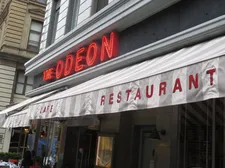 |
| The Odeon on West Broadway in Tribeca Photo: Anne-Katrin Titze |
EB: And for John Waters, did you go to Baltimore?
CD: I did not. But with John it was kind of funny, same thing as Eric Mitchell. John first declined. One of the ladies who was working at his office … I remember they were so nice on the phone with me. And I was kind of harassing them. And once they said okay, John is fine and you can go to his apartment in New York and do the interview. And John is so witty. I'm a huge fan of John Waters and totally fascinated by his work.
EB: And he is supportive of other creative people.
AKT: He explains the dangers of going out at night and facing being mugged every night and says it with a twinkle in his eyes.
CD: New York in the late seventies was bankrupt.
EB: Was fun.
CD: It's kind of different from what New York is today. Like here, below 14th Street was dangerous. It was bankrupt. I think it fostered a certain kind of energy.
EB: Definitely. Tower Records came to New York from L.A., I said, that's the end. And MTV.
AKT: That's what's in your film, too. Basquiat and MTV.
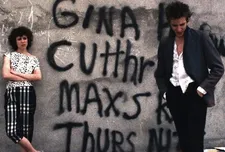 |
| ESG and Singers and Players from 99 Records in Susan Seidelman's Smithereens |
EB: What Tower Records called "alternative music" was not. It was embarrassing. It's like what's really "independent film" nowadays? They were just taking money from corporate to minimize and also to take over what alternative music is. Liquid Liquid came in the store one day, and they said "Ed, they're calling us post-funk. We're not post-funk anything! The [Village] Voice! We'll never talk to another person again."
I said "If you don't talk, imagine what they're going to call you." And then I read the article, and they were the leaders of post-funk. Above Lounge Lizards, above Konk, above all the others on the scene, Dog Eat Dog. And they were the top. That's what they're upset about? Labels, you know, you can't get upset about labels.
CD: No. Did you work with John Lurie of the Lounge Lizards?
EB: No. Was he doing drugs then?
CD: I don't know.
EB: I stayed away. On the Cinema of Transgression, when they talk openly, when Richard Kern talks openly about it. I had a radar for that. That's what I was worried about with Bush Tetras. That's why I wanted to see how they would function.
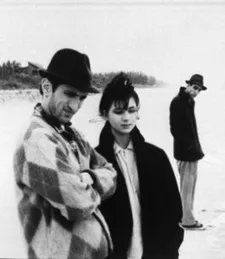 |
| Richard Edson (Konk), Eszter Balint and John Lurie (Lounge Lizzards) in Jim Jarmusch's Stranger Than Paradise |
CD: Yeah, being clean.
EB: Yeah, at least, I would always tell the bands, no drugs on tour. Because that's it. I'm done. And watching your film for the first time recently, I realized how right I was, because they [the filmmakers] talk about it themselves.
CD: Sure. It was like drugs was a very important part.
EB: Even at Mudd Club, too. You have the people talking about that, which is great. That's very rare. There are so many documentaries where it's people who have no clue and they just make stuff up. Like a commentary on some manifesto.
Ed departs and the Coen brothers seat themselves nearby.
AKT: It was a last-minute decision that Ed could come by to Odeon to say hello. I thought it would be nice, because he knew so many of the people in your film at the time.
CD: It's amazing, because he was there and he had this record label. And the music in Blank City is so important. I was able to use a lot of bands, you know, Bush Tetras, The Contortions.
Coming up - Celine Danhier on Downtown 81 and Maripol, Eric Mitchell, Cookie Mueller, Otto Preminger, growing up "watching New York movies", and her collaborators at Bunny Lake Films.








